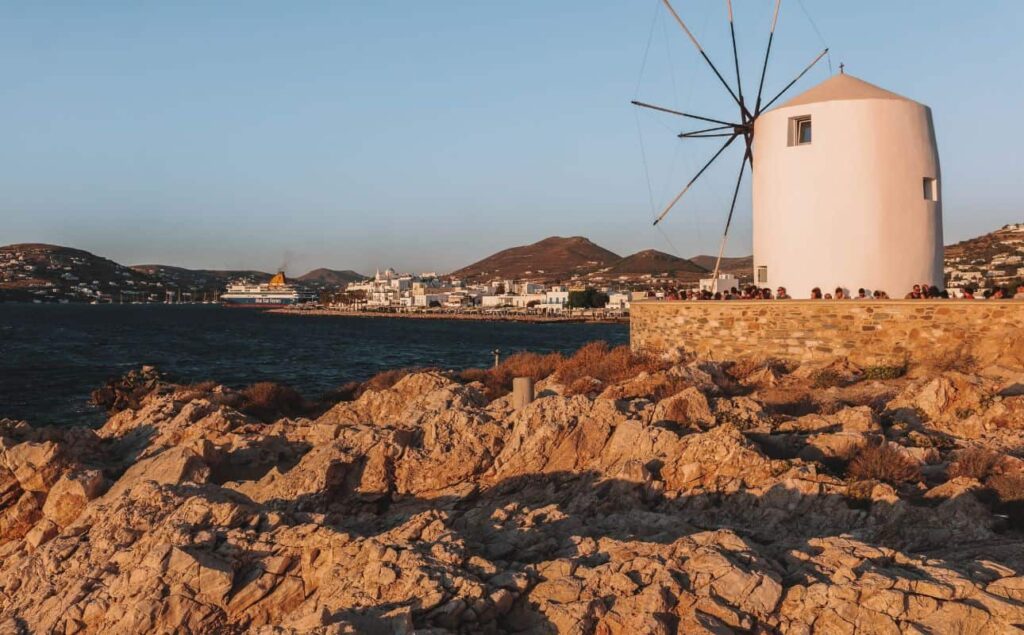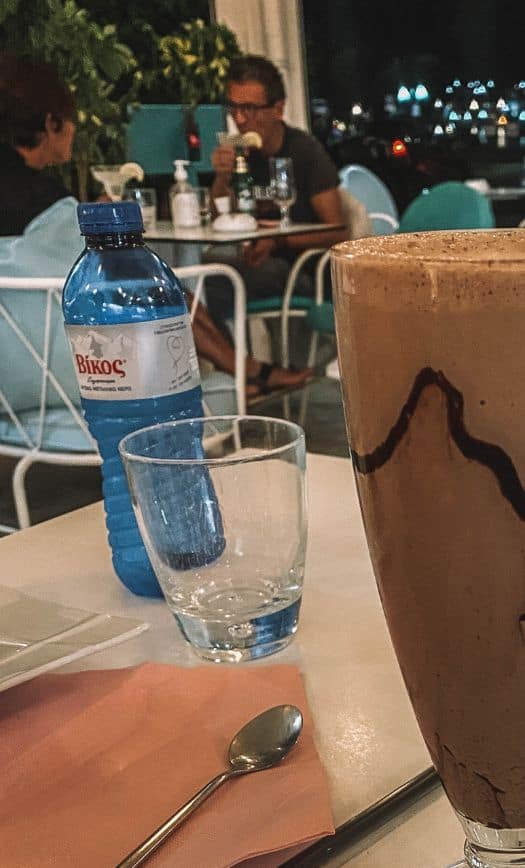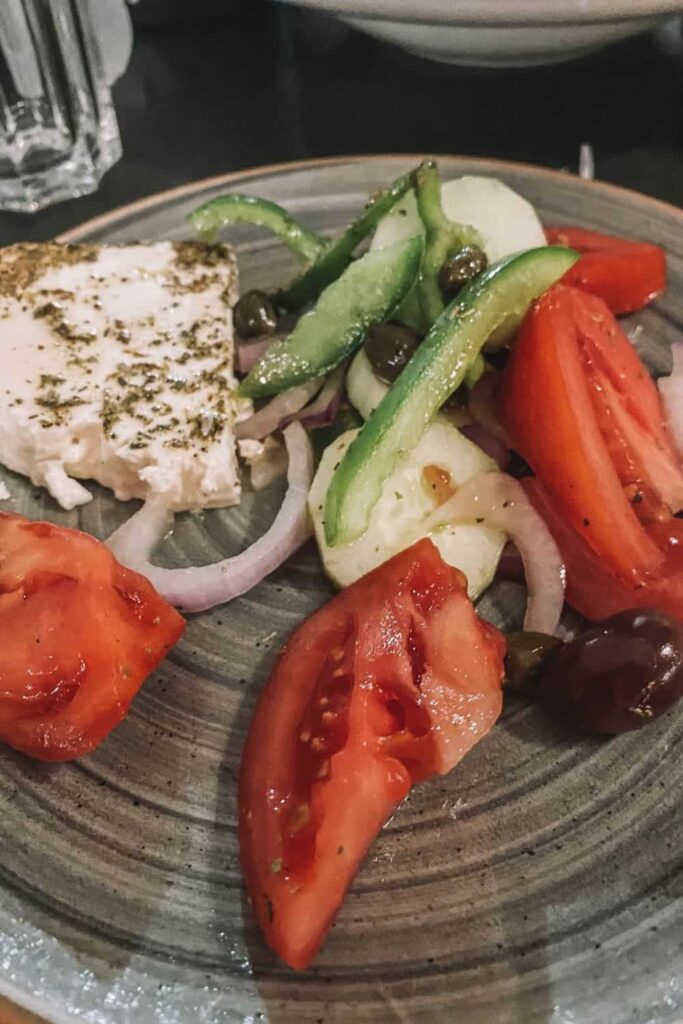Can You Drink Tap Water In Greece? Not Everywhere! The Complete Guide to Staying Safe
Can you drink tap water in Greece and the Greek Islands? We’ve got you covered! Eric and I have been visiting Greece and its romantic Islands for years and with all our Greece travel experiences, we’ve written many travel guides on different islands like Milos, Paros, Santorini, Antiparos and Ios.
But a Greece travel guide would not be complete without answering the question everyone is wondering when traveling to this romantic destination: Can you actually drink the water in Greece and is the tap water in Greece safe or will it make you sick? It would be a shame to ruin your European beach vacation just by drinking some water!
In this post, you’ll find everything you need to know about the quality of the Greek tap water, where you can drink tap water in Greece and what the best alternatives are, all backed up by OECD reports.

Can you drink tap water in Greece?
No, you can’t drink tap water everywhere in Greece.
Can you drink tap water on mainland Greece?
Yes, you can drink tap water in mainland Greece and large cities like Athens and Thessaloniki. The water in these areas comes from nearby man-made lakes of Marathon and Ylike, and it is considered safe for consumption.
Can you drink tap water in the Greek Islands?
However, it’s important to note that tap water is not recommended for drinking on the Greek Islands. During our visits to both mainland Greece and the Greek Islands, we always opted for Greek bottled water to ensure we could stay safe when drinking water whether that’d be to bring on the hot beaches like Sarakiniko or Kleftiko rock formations or to bring on boat trips like we did in Kleftiko.
Is tap water safe in Greece?
While tap water is safe to drink in major cities, it’s worth mentioning that some parts of mainland Greece may receive water through old pipes, which can result in an odd taste and brackish water. There is also a possibility of bacterial contamination in certain areas. According to a European Commission report from 2016, the drinking water in Greece was found to be 99-100% compliant with microbiological, chemical, and indicator parameters of the Drinking Water Directive.
However, it’s important to stay informed about the water quality in different regions. A report from the European Commission in 2018 projects that Greece will have one of the highest potential health risks due to non-safe drinking water in the European Union by 2050. Therefore, it’s advisable to rely on a bottle of water, especially when you are unsure about the water source or if you are traveling to remote areas.
By prioritizing your health and well-being, and opting for buying bottled water or other safe drinking options, you can ensure a pleasant and worry-free stay in Greece.
In short, the answer to the question “Can you drink the water in Greece” is that it depends where you are located and likely no if you are anywhere else than Athens.

Is the water safe to drink in Greece?
Yes, in Athens and Thessaloniki, the water is generally safe to drink. The water in these cities comes directly from nearby clear water lakes, such as Lake Marathon and Lake Ylike. Therefore, you can feel confident in drinking tap water in these areas.
However, it’s important to note that the situation is different on the Greek Islands. There are several reasons why tap water is not considered safe to drink there. Firstly, water is transported to the islands by cargo and stored in reservoirs, which can potentially transmit bacteria. Additionally, the old water pipes on the islands can contribute to bacterial infestation and lead contamination. The water may also contain higher levels of chlorine byproducts due to the treatment process.
Furthermore, the quality of water on the Greek Islands can vary. The water often comes from local drilling and is not as closely monitored as in larger cities. This means that there can be instances of poor water quality and even contamination in certain cases. Additionally, the water on some islands can be salty, which makes it unsuitable for drinking.
To ensure your health and well-being, it is recommended to opt for bottled water or other safe drinking alternatives while on the Greek Islands. By taking these precautions, you can enjoy your time in Greece without worrying about the safety of the water you consume.
How to know if the tap water is safe to drink where you are staying?
To ensure the safety of tap water in Greece, here are a few steps you can take:
- Ask your hotel or Airbnb owner: They are experienced in welcoming tourists and are aware that visitors may have concerns about the local Greece water. They can provide valuable information about the safety of the tap water in their establishment. Don’t hesitate to ask them whether the water is safe to drink. This is what we did and our hotels staff were always able to let us know when we shouldn’t drink the tap water, especially in the Greek Islands.
- Observe local behavior: Pay attention to the locals. If you see them drinking tap water without any concerns, it’s usually a good indication that the water is safe. Locals are accustomed to the water quality and can provide insights into its safety.
- Consult official sources: Check official sources such as travel advisories or government websites for any specific information about the safety of tap water in the particular region you are visiting. These sources often provide up-to-date information and guidelines for tourists.
- Use water purification methods: If you are uncertain about the tap water, consider using water purification methods such as boiling, using water purification tablets, or using a water filter. These methods can help remove potential contaminants and ensure the water is safe for consumption.
By following these steps and taking necessary precautions, you can make informed decisions about the safety of tap water in Greece and ensure a pleasant and worry-free experience during your visit.
What happens if you drink Greek water?
If you are wondering why can’t you drink tap water in Greece, it’s because it can cause serious health issues. Drinking Greek water that is not potable, such as on the Greek Islands, can have serious health consequences.
Why is tap water in Greece unsafe for drinking? The potential issues vary depending on whether you’re in mainland Greece or the Greek Islands. One common concern is the presence of lead in water due to old pipes, which can be harmful to your health, especially for vulnerable groups like children and pregnant women. Bacteria infestation is another risk, leading to gastrointestinal problems such as diarrhea, stomach aches, and cramps. It’s important to note that you can also get sick by using contaminated water for cooking, making ice, or even brushing your teeth.
To ensure your safety, we recommend seeking information from reliable sources, such as your hotel or Airbnb host, about the safety of tap water in your specific location. They are used to hosting tourists and can provide insights on whether the water is safe to drink. Additionally, using alternative water sources like bottled water or purified water can help minimize the risk of waterborne illnesses while you’re in Greece. Taking these precautions will help protect your well-being during your stay and avoid potential health issues associated with drinking Greek water.
How is water supplied in Greece?
The water supply in Greece is primarily sourced from groundwater, making it the dominant source of drinking water. Interestingly, Greece is one of only four EU countries that rely on desalination for their drinking water supply, according to the OECD. Despite being surrounded by water, the country faces challenges in ensuring sufficient water supplies. The availability of water can be affected by varying precipitation patterns, droughts, and the influx of tourists during the summer months.
Water management and regulation are overseen by the Greek government. In major cities like Athens and Thessaloniki, the water is supplied from nearby lakes, such as Lake Marathon and Lake Ylike. On the mainland, there are many mountains and rivers that serve as sources of fresh water, particularly from melting snow.
However, water supply methods differ among the Greek islands. Some islands have local water sources, which are supplemented by water delivered via tanker ships. Others rely on underground wells for their water supply. It’s worth noting that certain islands have limited or no natural sources of drinking water. For instance, Santorini and the stunning towns of Oia and caldera hotels of Fira rely on a few newly established sea water desalination plants as it lacks natural drinking water sources. In total, Greece draws over 40% of its usable water from underground sources.
Can you drink tap water in Paros?
Yes, you can safely drink tap water in Paros. The Paros Water Supply and Sewerage Company ensures that the tap water meets the necessary quality standards for consumption. During our visit to Paros, we had no hesitations in drinking the tap water and didn’t experience any negative effects on our health.
The water is treated and considered safe for drinking, so you can enjoy a refreshing glass of tap water without any concerns. However, if you prefer bottled water, it is readily available on the island, providing you with alternative options.
Can you drink water in Ios?
No, it is not recommended to drink the water from the pipes in Ios. The water on the island can be salty and does not taste good due to its source. Being a relatively small island, Ios does not have access to abundant fresh water sources, which can affect the quality of the tap water. We visited and stayed in Ios several times, and we were told by locals and our hotel not to drink tap water because it could make us sick.
Therefore, it is advisable to use bottled water for drinking purposes during your stay in Ios. Locals and hotels often advise against drinking tap water to prevent potential health issues that can arise from its consumption.

Can you drink water in Milos?
No, it is not recommended to drink the tap water in Milos. We stayed in the largest town of Adamantas, and the hotel staff told us not to drink the tap water. The quality of the water on the island does not meet the necessary standards for safe consumption on Milos. Milos is a beautiful island with stunning beaches so it would be a shame to ruin your visit with unsafe water. To avoid any potential health risks, it is best to rely on bottled water for drinking and even for brushing your teeth.
By opting for bottled water, you can ensure your hydration and avoid any discomfort that may arise from consuming tap water in Milos.

Where does Athens, Greece get its tap water from?
The tap water in Athens, Greece is sourced from nearby lakes, primarily Lake Marathon and Lake Ylike. These lakes serve as essential water sources for the city’s water supply.
Can you drink the tap water in Santorini?
No, it is not recommended to drink tap water in Santorini whether that’d be in the village of Pyrgos or near Vlychada beach. The water on the island is sourced from deep wells, cargo ships, or desalination plants. Santorini lacks natural freshwater sources, which contributes to the need for alternative water supply methods.
So if you’re wondering “Can you drink the water in Santorini”, the answer is that, due to these factors, the tap water in Santorini may not meet the desired quality standards for safe consumption. It is generally advised to opt for bottled water when staying in Santorini. Restaurants in Santorini typically serve bottled water rather than tap water, and you can easily buy bottled water throughout the island. Additionally, the taste of tap water in Santorini is often not pleasant as we’ve experienced!
In short, the answer to “Can you drink tap water in Santorini” is no.
Can you drink tap water in Crete Greece?
Can you drink the tap water in Crete? Yes, tap water in Crete, Greece is generally safe to drink. The water is sourced from local water sources such as the White Mountains and Psiloritis. The island receives significant rainfall during the winter months, contributing to a reliable supply of freshwater.
However, it is worth noting that some people may find the taste of the tap water in Crete less appealing. As a result, many visitors and locals choose to use bottled water for drinking purposes.
Can you drink tap water in Chania Crete? Yes, you can also drink the tap water in Chania Crete which is one of the biggest cities on the island.
When we went to Crete, we visited quite a bit of the island including Heraklion, Chania, the Topolia Gorges and Pink beach. We didn’t really like the tap water’s taste so we mostly relied on bottled water.
Can you drink the tap water in Athens
Can you drink the water in Athens? Yes, you can drink the tap water in Greece Athens. The water is treated and undergoes rigorous monitoring to meet the required quality standards. So you can feel confident in drinking the tap water in Athens, as it is sourced from reliable and regulated water bodies.
When we visited Athens, we had only visited the Greek Islands previously so we kept drinking bottled water. It’s only after a couple of days that we realized it was safe to drink the tap water of Athens! So the answer to “Can you drink tap water in Athens” is yes.
Can you drink tap water in Mykonos?
No, it is not recommended to drink tap water in Mykonos. The water on the island is known to be very salty, similar to Ios Island. As a result, the taste of the tap water may not be pleasant. Instead, we recommend relying on bottled water during your time in Mykonos. Bottled water is easily accessible and provides a reliable and safe alternative.
Can you drink tap water in Kefalonia?
Drinking tap water in Kefalonia is not highly recommended. The water on the island is sourced from underground supplies. While the water may be clean when it comes out of the sources, it can become contaminated as it passes through the pipes. There is a possibility of bacteria being present in the water supply. To avoid any potential health issues, we recommend using bottled water for drinking purposes on Kefalonia.
Can you drink tap water in Zante?
No, you cannot drink tap water in Zante, regardless of where you are on the island. It is not considered safe for consumption. Therefore, it is best to stick to bottled water to ensure your well-being and hydration during your time in Zante.
Can you drink tap water in Greece Rhodes?
Can you drink tap water in Rhodes? No, tap water in Rhodes is not potable. It is not recommended to drink the tap water on the island. To ensure your health and safety, it is best to rely on bottled water for drinking purposes throughout your stay in Rhodes.
Can you drink tap water in Thessaloniki?
Technically, the tap water in Thessaloniki is potable. However, it is important to note that the water is high in minerals, which can result in a strong taste and may be hard on sensitive stomachs. If you find the taste or effects of the tap water unpleasant, it is recommended to opt for bottled water as an alternative.

Can you drink tap water in Greece Kos?
Technically, tap water in Kos is considered potable. However, the water in Kos contains high mineral content, which can cause stomach pains or discomfort for some individuals. To ensure a comfortable and enjoyable stay, it’s better to stick to bottled water for drinking purposes.
Can you drink tap water in Greece Corfu?
Yes, technically, the tap water in Corfu is safe to drink. However, it is important to note that the water is also high in minerals in Corfu, which can lead to stomach pains . To avoid any potential issues, we recommend drinking bottled water during your time in Corfu.
Can you drink water in Greece hotels?
Whether you’re staying at a hotel or any other type of accommodation in Greece, the potability of the water depends on your location. If your hotel is in the Greek islands, it is likely that the tap water is not potable, and therefore, we recommend to drink bottled water. It is also better to use bottled water for activities like brushing your teeth and making coffee in the Greek islands. However, if your hotel is in Athens or other big cities on the mainland of Greece, the tap water at your hotel should be safe to drink.
Are ice cubes safe in Greece?
The safety of ice cubes in Greece depends on the source of water used to make them. In the Greek Islands, we recommend asking whether the ice cubes are made with tap water or bottled water if you’re at a restaurant. If they are made with tap water, they may not be safe to consume, especially in the Greek Islands. However, many hotels use bottled water to make ice cubes, which gets you a safe drink. If you have any doubts, we recommend removing the ice cubes from your drink before they have a chance to melt.
In our case, we never really inquired about ice cubes when getting drinks at bars whether that be in Athens, Santorini, Crete or Milos or another place in Greece. We never got sick either from our drinks.
Can you drink the water in the coffee in Greece?
Yes, it is generally safe to drink the water in coffee in Greece. We have personally never encountered any issues with it.
Can you drink bottled water in Greece?
Yes, it is advised to drink bottled water in Greece, especially in the Greek islands. Bottled water is safe to drink and readily available throughout the country. There are many different brands of water to choose from, and it is easy to find bottled water anywhere you go. Additionally, bottled water in Greece is often cheap, at least from our experience.
Is it safe to brush your teeth with tap water in Greece?
The safety of brushing your teeth with tap water in Greece depends on whether the water is potable. In some areas like Milos and Ios, we were advised by our hotel to use bottled water for brushing our teeth.
However, if the tap water is considered potable, it should be safe to use for brushing your teeth. It is always a good idea to check with your hotel or accommodation regarding the potability of the tap water before using it in your mouth.
Greek for water
Water in Greek is spelled νερό and pronounced neró. The Ancient Greek for water is ὕδωρ (húdōr).
Final thoughts: Can you drink tap water in Greece?
In conclusion, the question of whether you can drink tap water in Greece and the Greek Islands has a nuanced answer. When it comes to tap water in Greece, it largely depends on your location. If you are in the main cities on the Greek mainland, such as Athens and Thessaloniki, tap water is generally considered safe for consumption. However, it is always a good idea to check with your hotel or accommodation for any specific guidelines or advisories.
On the other hand, when it comes to the Greek Islands, tap water is not recommended for drinking in most areas. The water quality can vary, and there are concerns about bacteria infestation, saltiness, and taste issues. It is safer to rely on bottled water, which is widely available and affordable throughout Greece, including the islands.
During our visits to Greece, we found that tap water was often not potable in the Greek Islands. We followed the local advice and opted for bottled water to ensure our health and well-being. Additionally, it is important to note that using tap water for activities such as brushing teeth, making ice cubes, or cooking can also pose risks of contamination.
Therefore, we recommend staying safe and choosing bottled water when in Greece and the Greek Islands. By doing so, you can enjoy your stay with peace of mind, staying hydrated while exploring the beautiful landscapes, rich history, and vibrant culture that Greece has to offer.
As for the sea water, even though there can be sharks in Greek waters, it’s mostly safe to swim in there!
Can you drink tap water in Greece FAQs
No, as a tourist, it is generally not advisable to drink tap water in Greece, especially on the islands or in smaller villages on the mainland. Tap water can be consumed in Greece’s main cities on the mainland, such as Athens and Thessaloniki, but it’s always a good idea to check with your hotel or accommodation for any specific guidelines or recommendations regarding tap water consumption.
In the main cities on the Greek mainland, such as Athens and Thessaloniki, it is usually safe to drink tap water unless you are specifically advised otherwise by your hotel. However, in the islands and many other parts of Greece, tap water is not considered safe for drinking.
Yes, bottled water is a safe and reliable option for drinking in Greece. It is readily available and widely consumed by both locals and tourists. You can find various brands of bottled water in stores, supermarkets, and restaurants throughout the country.
If tap water is not considered potable, such as in many parts of the Greek islands, simply boiling it will not make it safe to drink. Boiling may kill some bacteria, but it does not remove other potential contaminants. It is recommended to rely on bottled water for drinking purposes to ensure your safety.
Yes, British people can drink tap water in Greece in areas where the water is deemed potable, such as in Athens. However, British people, like any other tourists, should avoid drinking tap water on the Greek Islands due to health and taste reasons. Bottled water is the recommended option.
No, in most parts of Greece, including hotels and accommodations, tourists are asked not to flush toilet paper down the toilet. Instead, there is usually a designated bin next to the toilet where you should dispose of toilet paper. This is a common practice to prevent plumbing issues, as the sewage systems in Greece is not be designed to handle toilet paper.
No, Greece is generally considered a safe country to visit. Like any popular tourist destination, it’s important to exercise caution and be mindful of your belongings, especially in crowded areas or tourist hotspots. Be aware of pickpockets and keep an eye on your personal belongings to ensure a safe and enjoyable trip.
Any questions on whether you can drink tap water in Greece? Drop them in the comments or on insta and we will get back to you asap.
— SAVE THIS POST —
Did you like this post? If you liked this post, don’t hesitate to share it!
Want to save this post? You can pin the following images on pinterest to save this post.
We are Mary and Eric, the founders of Be Right Back, a blog dedicated to romance around the globe and at home.
We are Mary and Eric, the founders of Be Right Back, a blog dedicated to romance around the globe and at home. With over 10 years of experience in dating and traveling to romantic places, we share our favorite date ideas and romantic destinations to help couples level up their relationships. Having lived in and traveled through the USA, we also share our favourite things to do in the States.
With 70,000 monthly readers and 16,000 followers on social media, Be Right Back is your go-to resource for romantic trip ideas and couple activities at home and abroad.
